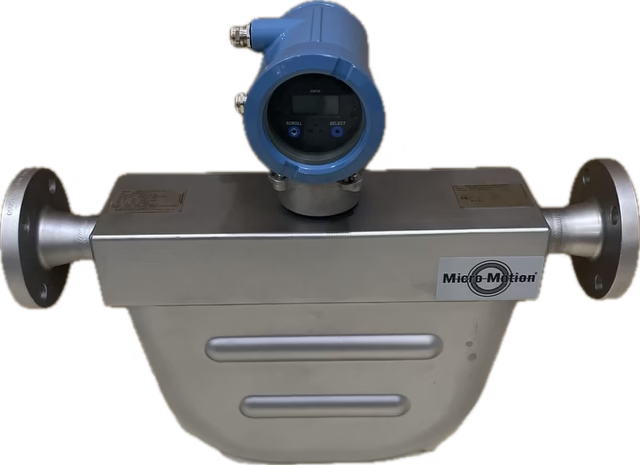Introduction to Coriolis Mass Flow Meters
Coriolis mass flow meters are sophisticated instruments designed to measure the mass flow rate of fluids with remarkable precision. Their operation is based on the Coriolis effect. This describes how a moving object influences its surroundings when subjected to rotation. In industrial applications, these meters are particularly valued for their accuracy and reliability. These attributes make them highly sought after in various sectors, including oil and gas, chemical production, food and beverage processing, and pharmaceuticals. Unlike traditional flow meters that measure volume, Coriolis mass flow meter focus on the mass of the fluid passing through them. This allows for more precise calculations that are less affected by changes in fluid density and viscosity.
Design of Coriolis Mass Flow Meters
The unique design of Coriolis mass flow meter incorporates a vibrating tube, which is crucial to their functionality. As fluid flows through the vibrating tube, it induces a change in the vibration frequency and phase shift. These changes are then used to calculate the mass flow rate. This makes this technology highly effective in applications where conventional meters may falter. The ability to directly measure mass flow streamlines processes and enhances quality control. This ensures that end products meet stringent industry standards.
Another notable advantage of Coriolis mass flow meters is their versatility. They can handle a diverse range of fluids, including liquids and gases, and accommodate varying temperatures and pressures. This adaptability positions them as a preferred choice for industries aiming to optimize efficiency and reduce waste. Given their numerous benefits, a comprehensive understanding of Coriolis mass flow meters is essential. This can help organizations looking to implement advanced flow measurement techniques. It paves the way for improved operational performance.

Advantages of Coriolis Mass Flow Measurement
Coriolis mass flow meter are renowned for their exceptional accuracy in measuring mass flow rate, volume, and density of fluids. This capability stems from the Coriolis effect. This allows these meters to provide real-time data with remarkable precision. Unlike traditional flow meters that estimate mass flow through volumetric measurements, Coriolis meter directly measure the mass flow. This results in a higher level of reliability. The integrated density measurement may also eliminate the need for separate density instruments. Thus, streamlining instrumentation needs in various applications.
Another significant advantage is their ability to handle a wide range of fluid properties. They are suitable for measuring both Newtonian and non-Newtonian fluids, including viscous and high-density liquids and gases. This versatility makes them applicable across diverse industries such as oil and gas, chemical processing, food and beverage, and pharmaceuticals. Additionally, Coriolis meters are highly reliable, capable of functioning optimally even under challenging conditions, such as fluctuating temperatures and pressures.
Disadvantages of Coriolis Mass Flow Measurement
However, Coriolis mass flow meters are not without their disadvantages. The primary drawback is their initial cost. These devices typically require a larger investment compared to other flow measurement alternatives. Furthermore, the physical size of Coriolis meters can be a limitation in some installations. This is particularly where space is at a premium. Additionally, these meters may struggle with certain fluid conditions, such as slurries or fluids with entrained solids. This can potentially lead to measurement inaccuracies. The complex design and sensitivity to mounting conditions may also lead to increased maintenance requirements.
Understanding both the advantages and disadvantages of Coriolis mass flow meters is crucial for making informed decisions regarding their application. By weighing these factors, users can effectively determine when to implement these advanced flow measurement devices in their operations.
Working Principle of Coriolis Flow Meter
The Coriolis mass flow meter operates based on the fundamental Coriolis effect. This states that a mass in a rotating system experiences an apparent force due to its velocity. This Coriolis effect is the cornerstone of how these meters measure mass flow rate. In a typical Coriolis meter, the fluid flows through a curved tube that oscillates at a specific frequency. As the fluid moves through the tube, it generates a phase shift in the oscillation. This is directly related to the mass flow rate of the fluid.
As the flow rate increases, the resulting Coriolis force induces a measurable deflection in the oscillating tubes. By detecting this phase shift, the meter can accurately determine not only the mass flow rate, but also the density of the fluid. The ability to measure both mass flow and density simultaneously is one of the key advantages of Coriolis mass flow meter. This distinguishes them from other flow measurement technologies. Additionally, it can account for temperature changes. This can be critical in many industrial processes.
precision of measurements
To ensure precise measurements, the internal mechanisms of a Coriolis meter are designed to minimize external influences. This includes temperature fluctuations and pressure changes, thereby enhancing the reliability of the readings. The integration of advanced sensors allows for real-time monitoring of these parameters, providing operators with comprehensive insights into the fluid properties. This is particularly important in applications that require stringent quality control and standardization. Understanding the working principles of Coriolis mass flow meters helps in selecting the appropriate device for specific needs. It also empowers engineers and operators to optimize their processes through precise measurements.
Applications of Coriolis Mass Flow Meters in Industry
Coriolis mass flow meter serve as critical instruments in various industries where precision and reliability are paramount. Their ability to measure mass flow directly enables sectors such as chemical processing, food and beverage, pharmaceutical, and oil and gas to optimize their operations. The increased demand for accurate flow measurement in these industries has led to the widespread adoption of Coriolis technology.
In custody transfer applications,
where the accurate measurement of product quantities is legally required, Coriolis mass flow meters excel due to their high precision. They ensure that the transferred amounts align with contractual obligations. This minimizes disputes over quantity discrepancies. This is essential not only in liquid transactions but also in gaseous applications. In these instances, a reliable flow measurement can significantly impact economic outcomes.
Moreover, in gas and liquid metering scenarios,
Coriolis mass flow meters efficiently accommodate the diverse flow conditions and process requirements. Their unique design allows them to handle various fluid types, including viscous and shear-thinning fluids, while maintaining accuracy across a wide range of temperatures and pressures. Such versatility ensures they are well-suited for critical processes that require a precise flow measurement. This includes blending and formulation operations.
Additionally, Coriolis mass flow meters find applications in special batching processes where specific quantities of materials are required. Proven technologies from leading manufacturers—such as Emerson’s Micro Motion, Endress+Hauser, Oval Corporation, and Bronkhorst—have contributed significantly to advancements in Coriolis flow measurement. These companies continually innovate to enhance the reliability and performance of their devices. This solidifies Coriolis technology’s reputation in the metering landscape.
Real-world examples illustrate the practicality and efficiency of these meters. In a food processing plant, for instance, precise ingredient batching can enhance product quality and consistency. In the oil industry, accurate measurement during custody transfer can result in significant financial savings. As industries push for greater efficiency and accuracy, Coriolis mass flow meters will undoubtedly remain integral to operational success.


Leave a Reply